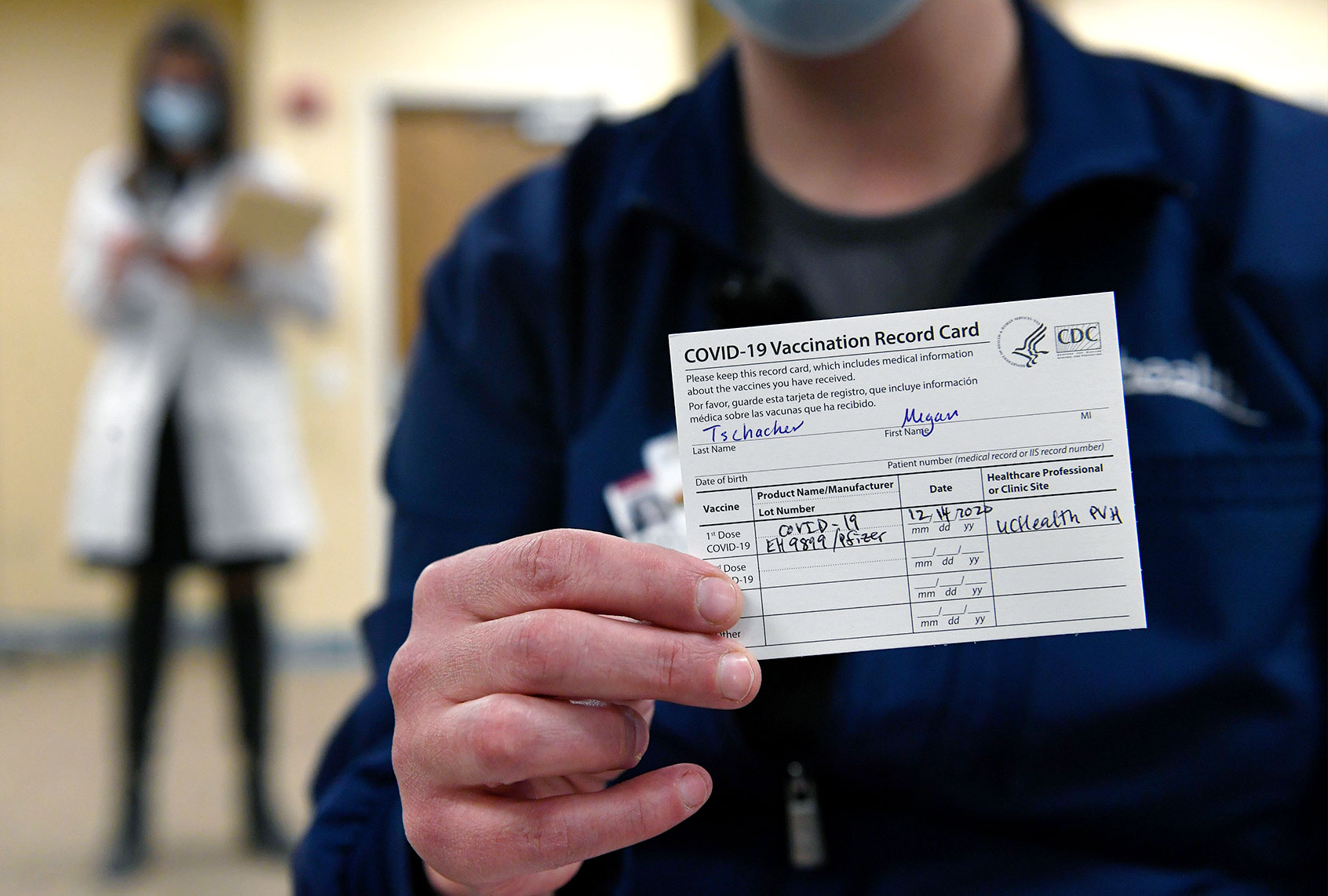You’ve seen them on social media: healthcare workers posing with a small index-sized card indicating that they have received their COVID-19 vaccine. Their appearance as a kind of status symbol might seem sinister: will society be split into two tiers, one of the vaccinated and card-bearing and another of the card-less?
Don’t worry about a pandemic dystopia just yet. We spoke to healthcare workers and public health experts about the SARS-CoV-2 vaccine card that is given out as a standard part of the vaccination process. And they say it’s a far less important piece of paper than it might seem, and it’s not even a big deal if one loses it.
The Centers for Disease Control and Prevention (CDC) explains on its website that after the first inoculation, the vaccinated will receive either a card or printout telling them which coronavirus vaccine they received. Currently, two different vaccines have been approved by the United States Food and Drug Administration (FDA): one from Pfizer/BioNTech, and one from Moderna. Both require two doses delivered in two separate shots for the vaccine to achieve full efficacy. For the Pfizer/BioNTech vaccine, patients receive the two doses three weeks apart; for the Moderna vaccine, the span of time is four weeks.
This distinction is a major reason why the COVID-19 vaccine card is important, in that it tells you — and perhaps your doctor or nurse — when you’re due for your second dose.
“The vaccination card is a piece of paper that just says, for example, you got the Pfizer vaccine, this is the lot number, this is a date you got it, and this is the date you get your second dose,” said Amesh Adalja, a senior scholar at Johns Hopkins Center for Health Security. Adalja said it wasn’t anything special. “It’s literally a flimsy piece of paper,” he added. “It’s not like a credit card, it’s not laminated, and it’s just for you to have a record that you got vaccinated.”
Adalja noted that after you receive any vaccination, you always receive a printout or a card.
“But most people just throw it in the trash can before they’ve left the doctor’s office,” he said.
But for a virus like the novel coronavirus, having that record can be important for things like travel or, perhaps eventually, enrollment in school. Indeed, being vaccinated may eventually be a requirement in order to enter certain countries. So if you throw away or lose the card, does that mean you’re out of luck?
Not quite. Litjen Tan, Chief Strategy Officer of the Immunization Action Coalition, told Salon there’s no need to worry if that happens. Technically, the card is a second form of documentation for receiving the COVID-19 vaccine. The first form is electronic.
“If they show up and say, ‘I’ve lost my car but I got my first dose,’ the provider who has been authorized to give COVID-19 vaccines will be able to look it up in the electronic system,” Tan said. “That being said, I would say, obviously to any patient who is going back for a second dose to call the provider and say, ‘I’m coming back to get my second dose, but I lost my card.'”
For this reason, Tan said fraudulent cards aren’t expected to be a problem. That’s because for now, the card also won’t be needed for anything else than keeping track of your vaccination schedule for now.
Yet in the future, it could be used for travel if you’re traveling somewhere that requires a COVID-19 vaccination.
“For international travel it might be something, but it’s probably going to be a different type of card,” Adalja said. “You could see those to be used as a way to avoid a quarantine or avoid a test when you’re going into another country.”
Adalja compared it to how some countries require proof of a yellow fever vaccine to travel to them.
Tan agreed, noting that if COVID-19 certificates are required for travel in the future, they wouldn’t be these “flimsy” cards, because they are too easy to fake.
Tan added that now is a good time for policymakers to be discussing how potential COVID-19 vaccination certificates could be used to reopen the economy in the U.S., too.
“I think we should be thinking about how we might be able to operationalize something like that for the future,” such as for business travel or increasing capacity for small businesses, Tan said.
But this is all “premature” thinking, Tan said. Right now, the goal is to get as many people as possible vaccinated.
“We’re in the middle of a huge surge, and we only have about 10 million people vaccinated; we’ve got to get more people vaccinated,” Tan said. “And then once we get to a point where we have maybe 40 percent of a community vaccinated, maybe you can then work with that, as well as the vaccine certifications.”

